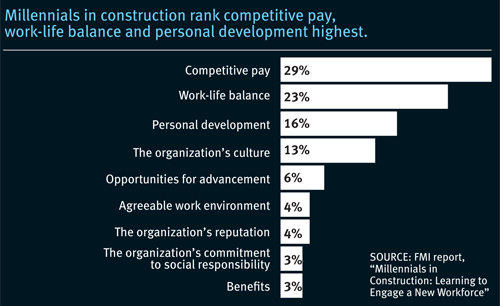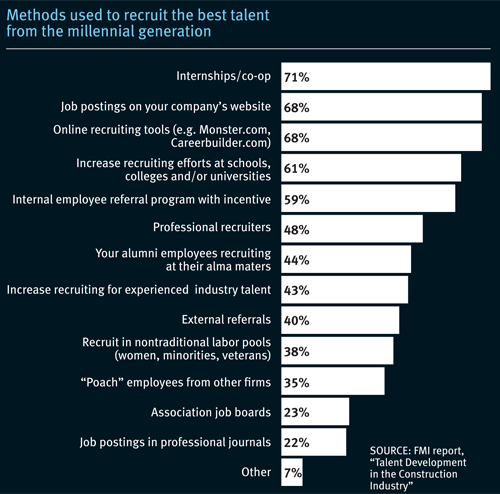Engaging the Millennial Workforce
Construction employers might be missing the mark when it comes to this generation
SOURCE: FMI CORP.
As the labor market continues to tighten and more of the nation’s 78 million-plus Baby Boomers head into retirement, construction firms will need to sharpen their hiring and recruiting pencils, say experts at FMI Corp., a provider of management consulting, investment banking and people development services to the engineering and construction industry.

Yet, employers might be missing the mark when it comes to employee retention and engagement in the construction workforce, especially in regards to Millennials, according to the firm’s 2015 “Talent Development in the Construction Industry” report. Employers surveyed for the report said that offering competitive pay, providing an enjoyable work environment and offering training opportunities are the top three methods they use to retain key talent. But when FMI asked Millennials what they felt was most important to keeping them engaged at work they responded with competitive pay (29 percent), work-life balance (23 percent) and personal development (16 percent). (See FMI’s 2015 industry survey: “Millennials in Construction: Learning to Engage a New Workforce”). The takeaway: if training is not offered as part of a comprehensive career development program, then it’s simply a way of paying attention to human “doings” rather than considering employees as human “beings,” FMI says. Still, according to its survey, only 19 percent of employers define career paths for their employees.
Internships can be a great way to not only attract Millennials to the construction workplace, but to retain them as well. Interns are able to get to know a company’s culture firsthand, while leaders are able to educate them about what the company stands for and why it exists. Having a defined and well-communicated vision is the first step in engaging employees in the long term, FMI’s findings suggest.

This is particularly important for Millennials, who want to do more than just punch a clock and take home a paycheck, according to the FMI report. They’re looking to add value, make an impact and find meaning in what they’re doing. Construction firms can leverage these realities by ensuring that younger workers have a clear sense of purpose and an understanding of their roles within the larger plan, FMI advises.
The full report, “Talent Development in the Construction Industry” is available from FMI Corp. at www.fminet.com, where the firm offers a variety of research, consulting and coaching services specific to the engineering and construction industry.

